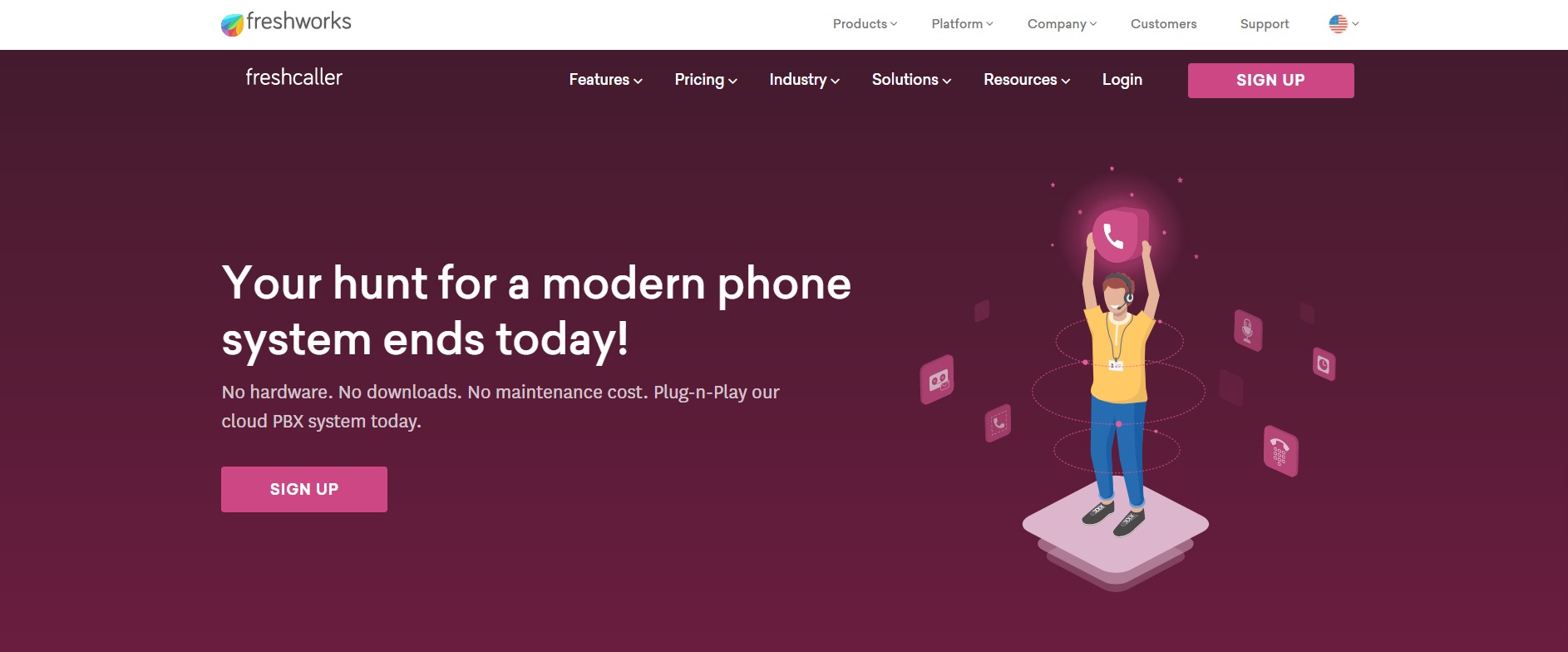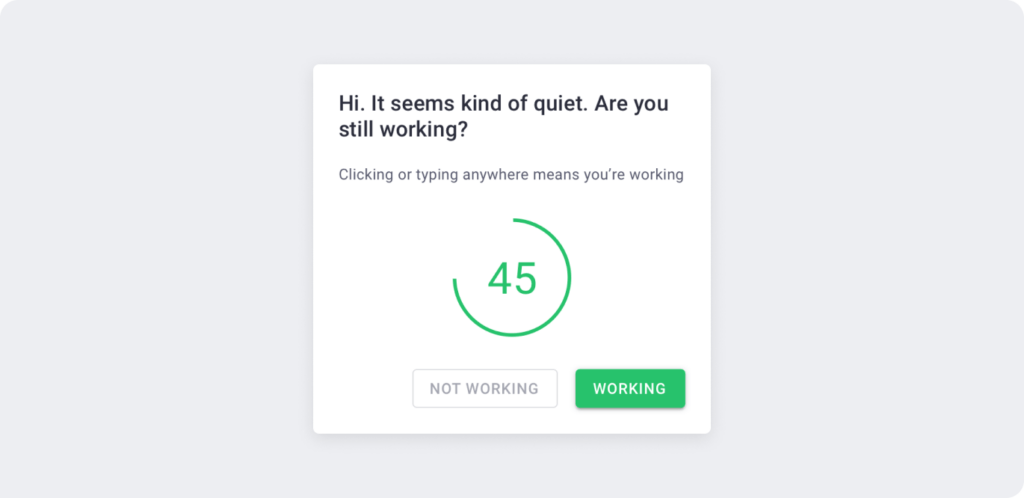Looking for the right BPO softwares for your call center business?
With hundreds of business process outsourcing tools available, finding the best ones for your call center can be confusing.
To help you out, we’ll cover the various types of call center tools and also highlight five essential BPO softwares you need in this article.
Table of Contents
- What is a BPO call center software?
- The three different types of BPO call center software
- The five essential business process outsourcing tools for any call center
Let’s get started.
What is a BPO call center software?
A BPO call center software helps call centers automate and optimize their business activities. It helps them save tons of time, money and other resources by streamlining their business process management (BPM).
For example, instead of relying on manual data entry of contact details, you can use a CRM tool to automate the process. Similarly, instead of calling each prospect individually, you can use an auto dialer to speed things up.
However, streamlining your business services isn’t all that BPO call center tools do.
Using the right BPO software also helps call centers improve their customer experience.
How?
Call center solutions like phone systems help you answer tons of customer calls to address their concerns and issues quickly. You can also use Interactive Voice Response (IVR) to guide your callers to the right agents according to their concerns. This way, you can instantly improve your customer satisfaction levels!
Here’s a closer look at the various kinds of BPO software used by call centers.
The three different types of BPO call center software
Here are three different types of BPO call center software:
1. On-premise software
On-premise call center software is software that is installed in your office, like an auto dialer that’s set up at your call center.
This includes setting up the hardware and infrastructure required to use the tool at your office. This could be things like phones, branch exchanges and direct lines. In most cases, your technical support team takes care of its installation and maintenance.
On-premise software keeps your data in-house as you don’t have to share it with any third-party service providers. You can also choose what upgrades and updates are needed as you’re installing and maintaining it.
However, on-premise tools have high upfront costs as you have to handle the hardware and infrastructure costs. Additionally, you need a dedicated technical support team to manage the software yourself.
2. Cloud-based software
Cloud-based call center software is software that is hosted in the cloud (online) by a service provider. Users can use the software via the internet and an app installed on their computer or mobile. For example, a CRM tool where the data is stored and accessed via the internet is a cloud-based tool.
Unlike on-premise software, cloud-based software has lower upfront costs as a third-party service provider maintains it. Additionally, as all the data will be online, you can easily access it from anywhere using multiple devices. This makes it perfect for virtual call centers with agents spread across the globe!
However, as a third-party is involved, cloud-based BPO solutions aren’t ideal for omnichannel call centers that want to keep their data in-house. You also need a reliable internet connection to use the tool efficiently.
3. Browser-based software
Browser-based software is similar to cloud-based call center solutions. The difference is that users can also access the software from their web browsers.
For example, phone systems that let you make or take phone calls from your browser are browser-based tools.
While it offers the same advantages as cloud-based software, browser-based software is far simpler to implement and use. It’s also a cost-effective solution as you can even choose from various prepaid plans.
However, they require a good internet connection and usually don’t come with a local data storage facility.
Note: Remember, the type of software you choose will depend on your call center setup and needs. For example, even though cloud-based software isn’t as comprehensive as on-premise solutions, it’s a better option for virtual call centers with no central office.
The five essential business process outsourcing tools for any call center
Here are five must-have BPO softwares for any call center:
1. Phone systems
Most call centers handle tons of inbound and outbound calls everyday.
To manage this call volume, you need phone systems with advanced features like call transferring, group conferencing, voicemail support and more.
Here are two phone systems to consider for your business:
A. CloudTalk

Cloudtalk is a popular cloud-based phone system used by sales and customer support teams. It offers real-time analytics that tracks call activity and other data to help you boost your customer service.
Key features
- Interactive voice response (IVR) menus to guide callers.
- Automated call distribution (ACD) that auto-directs callers to skilled agents.
- Real-time customer cards that display each caller’s details, including their past call data.
- Customized call queues.
- Integrates with CRM tools like HubSpot, Pipedrive, Salesforce and Zoho.
Pricing
Cloudtalk offers four pricing schemes:
- Starter: $22/month per user – unlimited inbound calls and call queuing + ACD + voicemail + call recording.
- Essential: $30/month per user – includes “Starter” features + personalizations + conference calls + call masking.
- Expert: $50/month per user – includes “Essential” features + smart dialer + dedicated account manager.
- Custom: custom pricing – includes “ Expert” features + custom reporting + Service Level Agreement (SLA).
B. Freshcaller

Freshcaller is a cloud-based phone system that helps contact centers keep track of call queues and conversations. It also lets you purchase phone numbers from 80+ countries, including the United States.
Key features
- Create unique phone numbers tailored for your brand.
- Real-time dashboard that monitors ongoing calls.
- Seamless call transfer mechanisms.
- Special routing plans to handle phone calls during holidays.
- Integrates with Freshsales CRM.
Pricing
The software comes in four pricing plans:
- Sprout: free – supports basic call queues + custom greetings + call blocking features.
- Blossom: $25.30/month per user – includes “Sprout” features + call masking + IVR + voicemail features.
- Garden: $43.57/month per user – includes “Blossom” features + conference calling + advanced call metrics.
- Estate: $70.92/month per user – includes “ Garden” features + holiday routing + omnichannel routing + agent activity reports.
2. Auto Dialers
Auto dialers are call center solutions that automatically dial phone numbers from a contact list. When someone answers the call, it either connects them to an agent or plays a recorded message you have already set up.
This way, you can reach out to hundreds of clients or customers quickly!
Here are two smart auto dialers you could use:
A. CallFire

CallFire’s auto dialer lets you call multiple contacts without manually dialing their numbers. It connects the call to your agents only when a live person answers it.
Key features
- Automatically bypasses wrong numbers, dropped calls and busy signals.
- Supports voicemail recognition.
- Can use voice broadcasting to send thousands of messages quickly.
- SMS messaging to send follow-ups.
- Has integrations with Mailchimp, Salesforce and Zoho.
Pricing
While all CallFire pricing plans offer all the features, their pricing tiers are based on the number of minutes you can use them for:
- Lite: $99/month – supports 2500 call minutes/texts.
- Startup: $199/month – supports 5500 call minutes/texts.
- Grow: $299/month – supports 10000 call minutes/texts.
- Pro: $599/month – supports 20000 call minutes/texts.
B. KOOKOO CloudAgent

KOOKOO CloudAgent is a popular auto dialer for SMBs. It has multi-channel call support for voice, email and SMS services.
Key features
- Live dashboard that displays call analytics.
- Automatic Do Not Disturb (DND) filtering.
- Detailed call recording and logging.
- Has CRM integrations with Salesforce, Zendesk and Zoho.
Pricing
The auto dialer comes in two pricing plans:
- Pro+: $65/month per user – call controls + recordings + CRM integrations + dialer APIs.
- Enterprise: custom pricing – includes “Pro” features + voice bots + add-on channels for Facebook, WhatsApp, email and more.
Click here for more information on auto dialers.
3. Customer Relationship Management (CRM) software
The more you know about your callers, the easier it is for you to attend to them, right?
If you know your caller’s details, you can resolve their needs and concerns quickly while also personalizing the interaction.
But how do you store and access this information for hundreds of leads or customers?
By using a CRM tool.
Call center CRMs are software solutions that store all your caller data and give you access to it whenever you need it. As it gives you a holistic view of a caller’s interests, you can deliver a personalized service to improve their customer experience.
Here are two popular CRM software used by contact centers:
A. Salesforce CRM

Salesforce is a high-quality software company with a powerful CRM that acts as an integrated platform for all your business activities like sales, marketing and customer service.
Key features
- Omnichannel call routing.
- Live agent chat support.
- Real-time reports that can be customized.
- Can monitor and respond to customer posts on social media.
- Integrations with Gmail and Outlook.
Pricing
Salesforce CRM offers four pricing plans:
- Essentials: $25/month per user – Offers account, contact, lead and opportunity management + email integration + Salesforce mobile app.
- Professional: $75/month per user – includes “Essentials” features + sales forecasting + lead scoring.
- Enterprise: $150/month per user – includes “Professional” features + workflow automation + sales team collaboration.
- Unlimited: $300/month per user – includes “Enterprise” features + 24/7 support + advanced developer solutions.
B. Zoho CRM

Zoho CRM automates your business activities and lets you connect with your customers wherever they are.
Key features
- Real-time notifications of customer activities.
- Omnichannel support across telephony, email, social media and live chat.
- Detailed analytics and reports.
- G Suite and Office 365 integrations.
- Has mobile apps for Android and iOS devices.
Pricing
The software comes in four pricing plans:
- Starter: $8.43/month per user – basic workflow automation + store 5000 records + Slack integration.
- Standard: $15.18/month per user – includes “ Starter” features + sales reminders + store 10000 records + custom reports.
- Professional: $25.30/month per user – includes “ Standard” features + store unlimited records + process management features.
- Enterprise: $37.95/month per user – includes “ Professional” features + visual CRM views + artificial intelligence features.
4. Instant messengers
While you need BPO softwares to streamline customer interactions, you also need tools for your agents to communicate their needs and concerns.
While some companies invest in physical intercoms for internal communication, this isn’t possible for a virtual call center.
That’s why it’s a smarter idea to invest in online messaging platforms that let your agents interact irrespective of their locations.
Here are two tools that can help you out:
1. Slack

Slack is a popular messaging tool used by BPO companies for managing their team communications.
Key features
- Supports team-specific communication channels.
- Real-time notifications on desktop, mobile and email.
- Can pin the important messages and links within conversations.
- Can set reminders for messages, events or deadlines.
- Supports integrations with tons of workplace software like Google Docs and Zapier.
Pricing
Slack comes in three pricing plans:
- Standard: $3.20/month per user – 10 GB storage per user + unlimited integrations + group calls and screen sharing features.
- Plus: $6/month per user – includes “Standard” features + 20 GB storage per user + user provisioning and de-provisioning + 24/7 support.
- Enterprise Grid: custom pricing – includes “ Plus” features + 1 TB storage per user + unlimited workspaces + organization-wide channels.
2. Troop Messenger

Troop Messenger is an all-in-one business communication platform that can be used by outsourcing companies of all sizes. It’s the perfect way to connect your human resources and keep them on the same page.
Key features
- Can create private chats that auto-expire.
- Has read receipts for messages.
- Supports video and voice calls.
- Can flag important messages.
- Advanced search filters for images, videos or contacts.
Pricing
The software offers three pricing plans:
- Premium: $1/month per user – offers read receipts + group chats + audio and video calling + search filters.
- Enterprise: $4.99/month per user – includes “Premium” features + screen sharing + private chats + dedicated account manager.
- Self Hosting: custom pricing – includes “Enterprise” features + assign tasks + staff attendance tracker.
5. Performance trackers
Running a call center can be daunting.
Think about it.
It doesn’t matter if you’re offering customer support for back-office services, IT services or any other outsourcing services, you’ll still have to:
- Attend and resolve caller concerns and issues.
- Review call logs and reports.
- Prospect potential leads and customers.
- Manage finances.
- Implement new business ideas.
- And more.
Amid all these responsibilities, you can’t afford to monitor your call center staff manually, right?
However, without monitoring them, you won’t know if they’re handling calls or wasting time during work hours.
Luckily, performance trackers like Time Doctor make monitoring employees a breeze for call centers.
What’s Time Doctor?

Time Doctor is a time tracking and employee management software that’s used by large companies like Apple, PwC and also by small businesses like Firehouse Subs.
It helps companies:
- Monitor what their employees are doing during work hours.
- Track the time they spend on tasks and calls.
- Ensure that their staff is actively working.
- Identify activities that take a lot of time.
- Bill clients with accurate records.
Key features
Here’s a closer look at how Time Doctor helps you:
A. Keep track of your employees’ activities during work hours
Time Doctor auto-generates detailed Project Reports that breakdown each employee’s work activity. It shows you who worked on what tasks to help you identify the time they spent on it.
For example, you can clearly know the time a call center agent spent on handling phone calls by checking their Project Report.
As these reports are highly accurate, you can also use it to bill clients and outsourcers for the time you spent answering their customer calls.

Note – Time Doctor does NOT track a user when they aren’t running the timer.
B. Ensure that they are actively working
Worried that your agents are passing off idle hours as work hours?
Time Doctor has a built-in inactivity tracker that automatically pauses a user’s timer after three minutes of inactivity. This way, your agents have to be actively working for their work to be logged in the software.

Note – Time Doctor does NOT track which keys are pressed to determine inactivity; it only determines if any keys are pressed or not.
C. Prevent them from getting distracted
With Time Doctor, you won’t have to worry about your staff using unproductive websites and apps like social media during work hours.
The tool’s powerful distraction management feature displays a pop-up when someone accesses any such websites or apps. This nudge is enough to get your agents back to answering customer calls and resolving concerns.

D. Instantly integrates with your other call center software
Time Doctor seamlessly integrates with popular call center software to streamline your BPO services. You can integrate it with your project management software, CRM tools, help desk apps and even your invoicing software. This helps you track the time spent by your employees on all these tools.

Click here for the full list of integrations.
Conclusion
Whether you’re starting your first call center or looking to streamline your existing services, you need to choose the right BPO software for your business needs.
Check out the tools we covered here to get started immediately. Have any other questions about the right tools for your BPO company? Let us know in the comments below.

Liam Martin is a serial entrepreneur, co-founder of Time Doctor, Staff.com, and the Running Remote Conference, and author of the Wall Street Journal bestseller, “Running Remote.” He advocates for remote work and helps businesses optimize their remote teams.


